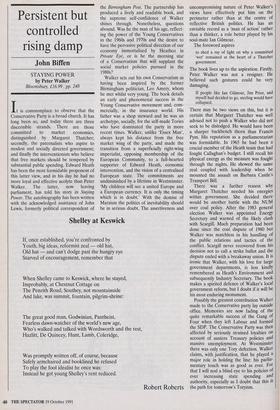Persistent but controlled rising damp
John Biffen
STAYING POWER by Peter Walker Bloomsbury, £16.99, pp. 248 It is commonplace to observe that the Conservative Party is a broad church. It has long been so, and today there are three discernible strands. There are those committed to market economics, distinguished by Margaret Thatcher; secondly, the paternalists who aspire to modest and socially directed government; and finally the interventionists who believe that free markets should be tempered by substantial public spending. Edward Heath has been the most formidable proponent of this latter view, and in his day he had no more loyal and effective acolyte than Peter Walker. The latter, now leaving parliament, has told his story in Staying Power. The autobiography has been written with the acknowledged assistance of John Lewis, formerly political correspondent of the Birmingham Post. The partnership has produced a lively and readable book, and the supreme self-confidence of Walker shines through. Nonetheless, questions abound. Was he the man of his age, reflect- ing the power of the Young Conservatives in the 1960s and 1970s and the desire to have the pervasive political direction of our economy immortalised by Heathco in Private Eye, or is he the morning star of a Conservatism that will supplant the social market policies pursued in the 1980s?
Walker sets out his own Conservatism as having been inspired by the former Birmingham politician, Leo Amery, whom he met whilst very young. The book details an early and phenomenal success in the Young Conservative movement and, com- mercially, in the insurance world. His father was a shop steward and he was an archetype, socially, for the self-made Tories who have dominated the party in more recent times. Walker, unlike 'Essex Man', always kept his distance from the free market wing of the party, and made the transition from a superficially right-wing imperialist, opposing membership of the European Community, to a full-hearted supporter of Edward Heath, economic intervention, and the vision of a centralised European state. The commitments are undiminished by a lifetime in Westminster. 'My children will see a united Europe and a European currency. It is only the timing which is in doubt.' With the demise of Marxism the politics of inevitability should be in serious doubt. The assertiveness and
uncompromising nature of Peter Walker's views have effectively put him on the perimeter rather than at the centre of reflective British politics. He has an enviable record as a 'man of action' rather than a thinker, a role better played by his soul-mate Ian Gilmour.
The foreword aspires to shed a ray of light on why a committed 'wet' remained at the heart of a Thatcher government.
The book lives up to the aspiration. Firstly, Peter Walker was not a resigner. He believed such gestures could be very damaging.
If people like Ian Gilmour, Jim Prior, and myself had decided to go, sterling would have collapsed.
There may be two views on this, but it is certain that Margaret Thatcher was well advised not to push a Walker who did not seek to be dislodged. He would have been a sharper backbench thorn than Francis Pym. His reputation as a parliamentarian was formidable. In 1965 he had been a crucial member of the Heath team that had fought Callaghan's budget. I still recall his physical energy as the measure was fought through the nights. He showed the same zeal coupled with leadership when he mounted the assault on Barbara Castle's Transport Bill.
There was a further reason why Margaret Thatcher needed his energies within government. She decided there would be another battle with the NUM over coal policy. After the 1983 general election Walker was appointed Energy Secretary and warned of the likely clash with Scargill. Much preparation had been done since the coal dispute of 1980 but Walker was matchless in his handling of the public relations and tactics of the conflict. Scargill never recovered from his decision not to call a strike ballot and the dispute ended with a breakaway union. It is ironic that Walker, with his love for large government departments, is less kindly remembered as Heath's Environment and subsequently Industry Secretary. The book makes a spirited defence of Walker's local government reform, but I doubt if it will be his most enduring monument.
Possibly the greatest contribution Walker made to the Conservative party lay outside office. Memories are now fading of the quite remarkable success of the Gang of Four when they left Labour and formed the SDP. The Conservative Party was then affected by seriously strained loyalties on account of austere Treasury policies and massive unemployment. At Westminster there was only one Tory defection. Walker claims, with justification, that he played a major role in holding the line: his parlia- mentary touch was as good as ever. For that I will nod a blind eye to his policies of ever increasing state spending and authority, especially as I doubt that this is the path for tomorrow's Toryism.


























































 Previous page
Previous page